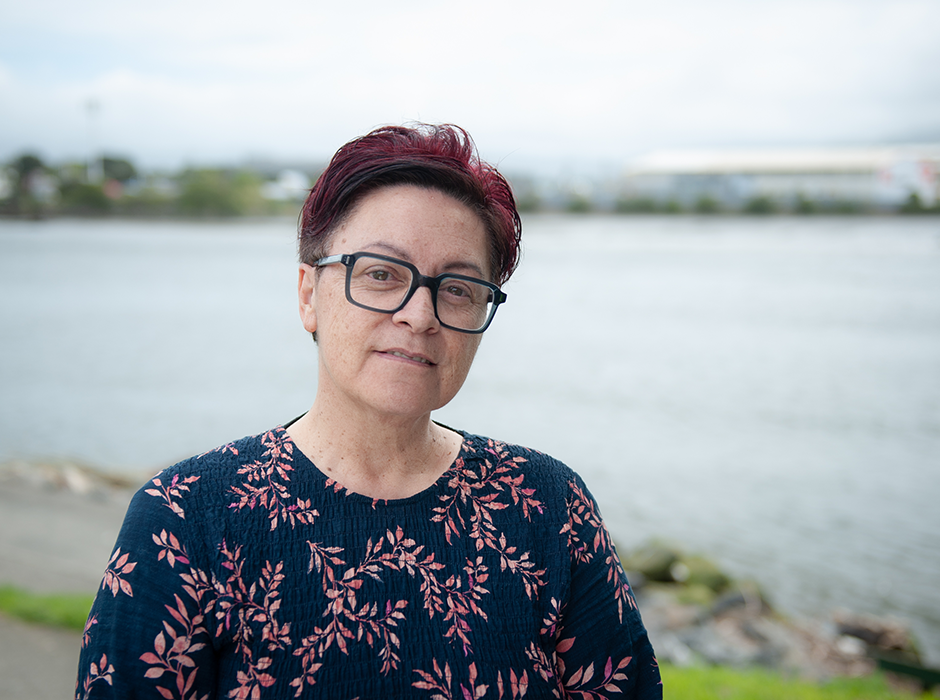
Cheryl Davies has been awarded the HRC Te Tohu Rapuora Medal.
A public health researcher on the Wellington campus, Cheryl Davies (Ngāti Raukawa, Ngāti Wehiwehi, Ngāti Mutunga ki Te Wharekauri), has been awarded the Health Research Council of New Zealand (HRC)’s Te Tohu Rapuora Medal for her transformative work in Māori communities.
The medal was presented at a Royal Society Te Apārangi Research Honours awards ceremony in Wellington on 28 November.
The HRC says her work as founder and manager of the Tū Kotahi Māori Asthma Trust at Kōkiri Marae in Wellington has made a tangible difference to improving health outcomes.
Cheryl set up the trust in 1995 to provide asthma education and advocacy services to whānau in the wider Wellington region. The work soon extended into health research, initially in helping recruit Māori to participate in studies by the University of Otago, and then to participating in all areas of the research process.
Cheryl says her guiding principle for working with Māori communities is to “do what you say you’re going to do, and work with integrity”.
“It’s often a big thing for whānau to let you come in to their homes and communities to undertake research. I spent a lot of my time with whānau in those early years allaying their fears about research and building the trust and credibility of Tū Kotahi and Kōkiri Marae as researchers coming into their communities.”
Her journey into research began in the 1990s following the release of the Māori Asthma Review by Professor Eru Pōmare, which recommended substantial improvements in asthma management and education, with significant involvement of Māori.
She names Dr Lis Ellison-Loschmann from Flax Analytics and Teresea Olsen, general manager of Kōkiri Marae, as two of her greatest mentors.
She says with their support she has been privileged to be able to work with research teams on the Wellington campus, including the Eru Pōmare Māori Health Research Centre, He Kāinga Oranga/Housing and Health Research Programme and the Cancer and Chronic Conditions (C3) research group, that have made a significant difference to health outcomes and highlighted successful health pathways.
She worked on the HRC-funded Pukapuka Hauora (Healthy Lungs) Asthma Study led by Bernadette Jones from the Department of Medicine; with He Kāinga Oranga Co-director Distinguished Professor Philippa Howden-Chapman and her team on healthy homes research; and more recently with Dr Hemakumar Devan from the Department of Medicine on chronic pain research.
Cheryl believes Tū Kotahi’s success in the research area comes down to her team knowing their communities and always having a whānau ora focus.
“I’m mindful when we do our research that we can offer support services to whānau if needed.
“We might go into someone’s home because they have a child with asthma, but once we get there, we can see that their home is damp and that the whānau need some kai. We know that we can help address a lot of these issues through the wrap-around support of Kōkiri Marae and the other services within our whānau ora collective.”
HRC Chief Executive Sunny Collings says Cheryl and Tū Kotahi’s research has led to tangible health gains through the delivery of effective and timely health services.
“Cheryl has consistently shown commitment to ensuring the research is highly responsive to the health needs and aspirations of local communities and that whānau benefit directly. The findings of her research are then directly incorporated into services, alongside the more traditional pathways to policy impact, which has proved to be a highly effective way of supporting improved health outcomes for communities with high health needs.”
The Te Tohu Rapuora Medal recognises contributions to Māori health leadership. It is one of three prestigious HRC medals presented annually at the Royal Society Te Apārangi Research Honours awards ceremony.